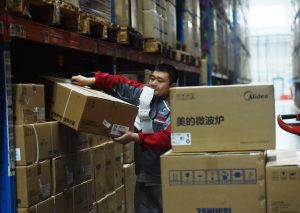Singles’ Day, China’s annual shopping fest on November 11, is by now as renowned for wastefulness as it is for commerce. My email inbox every November attests to this anxiety, which rises as predictably and short-lived as the shopping holiday. Tech companies’ response has been a smattering of quick fixes.
Take Alibaba as an example. The owner of Taobao.com and TMall has put forward a series of individual efforts, ranging from optimizing packaging with AI technology and establishing recycling stations to the award-winning tree-donating Ant Forest app. But the tech giant, which has ventured into fields as diverse as delivery, rental bikes, fintech, retail, and grocery stores, still hasn’t put forward a comprehensive view of its actual environmental footprint. As a result, we know quite little about the actual climate impact or sustainability of the company that runs China’s biggest online marketplace.
What we do know is that single-use materials are still the default for the more than 60 billion deliveries sent in China each year. However, online retailers have to acknowledge that there are other equally, if not more, pressing environmental issues to take responsibility for. The data centers and cloud services that enable the online marketplaces guzzle electricity, for example. Even the electrical bikes used to deliver orders exhaust almost 20,000 batteries each year, according to one estimate.
Truly escaping this cycle of convenience, growth, crisis, regret, and false solutions would require Alibaba to present a comprehensive overview of its impact. And one should be forthcoming, as the tech giant is required to submit key environmental performance data to the Hong Kong Stock Exchange, within one year of its listing.
For an endeavor this wide-stretching, data transparency has to be the first step. The quality of data reporting, like Alibaba’s upcoming disclosure, is a key indicator, because high-quality data transparency can only come from a dedicated internal task force working professionally on monitoring and evaluating its sustainability performance.
Looking at China’s two largest online retailers, JD.com is a step ahead of Alibaba in this respect. JD.com reported greenhouse gas emissions in its 2020 ESG report, including emissions of its supply chain and business ecosystem, also known as “scope three emissions.”
Only with good internal structure to manage sustainability and high-quality, standardized data reporting can these platform companies take game-changing action to shift systems toward ambitious and science-based action on their carbon footprint and sustainability. One major move would be decarbonizing energy consumption by purchasing renewable energy at scale. No one in China’s e-commerce has joined the RE100 global initiative or made pledges at the level of adopting 100 percent renewable energy by 2030. Globally, only a few large e-commerce companies worldwide have made such a commitment, including Amazon, Ebay, Etsy, Askul, and Rakuten.
A huge challenge for platform companies is how they can decarbonize their business ecosystem. Alibaba, JD.com, and Pinduoduo are marketplaces where much of the climate footprint comes from suppliers, sellers, and customers. Looking at their U.S. counterpart Amazon, for instance, three quarters of GHG emissions are from indirect emissions that occur in their value chain, or scope three emissions. Nothing short of a fundamental paradigm shift in how platform companies view and conduct environmental sustainability management will solve this. But the journey must start with collecting data that reflect the status quo.
The 2020 Singles’ Day Shopping Festival saw Alibaba and JD.com rake in $115 billion in sales. This year, the number is expected to grow, as the COVID-19 pandemic has accelerated the growth of the e-commerce sector worldwide. Growth, it seems, is not such a big issue for them. But for this Singles’ Day and many more to come, sustainability is their real challenge.
































